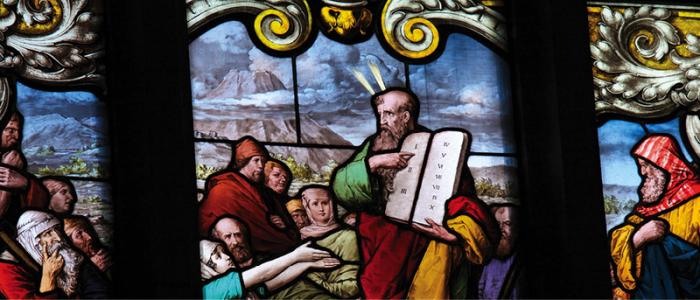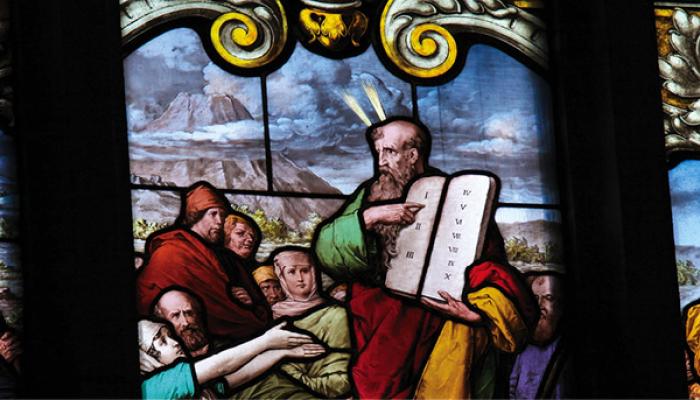
1.19 Should I follow all the rules in the Bible?
Jesus did not come to earth to abolish the laws of the Old Testament, but to fulfil them. The New Testament sheds new light on the Old Testament. Some Biblical laws no longer apply because Jesus has given us a higher law which is based on loving your neighbour. Jesus tells us, for instance, that loving our enemies is better than seeking revenge when something bad happens to us.
Other laws, such as the Ten Commandments, are still valid. The Church, guided by the Holy Spirit, helps us to realise which laws still apply to us and which do not.
Why does Sacred Scripture teach the truth?
Because God himself is the author of Sacred Scripture. For this reason it is said to be inspired and to teach without error those truths which are necessary for our salvation. The Holy Spirit inspired the human authors who wrote what he wanted to teach us. The Christian faith, however, is not a “religion of the Book”, but of the Word of God – “not a written and mute word, but incarnate and living” (Saint Bernard of Clairvaux). [CCCC 18]
How can Sacred Scripture be “truth” if not everything in it is right?
The Bible is not meant to convey precise historical information or scientific findings to us. Moreover, the authors were children of their time. Their forms of expression are influenced by the sometimes inadequate cultural images of the world around them. Nevertheless, everything that man must know about God and the way of his salvation is found with infallible certainty in Sacred Scripture. [Youcat 15]
What is the unity that exists between the Old and the New Testaments?
Scripture is one insofar as the Word of God is one. God’s plan of salvation is one, and the divine inspiration of both Testaments is one. The Old Testament prepares for the New and the New Testament fulfills the Old; the two shed light on each other. [CCCC 23]
What significance does the Old Testament have for Christians?
In the Old Testament God reveals himself as the Creator and preserver of the world and as the leader and instructor of mankind. The Old Testament books are also God’s Word and Sacred Scripture. Without the Old Testament, we cannot understand Jesus.
In the Old Testament a great history of learning the faith begins, which takes a decisive turn in the New Testament and arrives at its destination with the end of the world and Christ’s second coming. The Old Testament is far more than a mere prelude for the New. The commandments and prophecies for the people of the Old Covenant and the promises that are contained in it for all men were never revoked. In the books of the Old Covenant we find an irreplaceable treasure of prayers and wisdom; in particular, the Psalms are part of the Church’s daily prayer. [Youcat 17]
What significance does the New Testament have for Christians?
In the New Testament God’s revelation is completed. The four Gospels according to Matthew, Mark, Luke, and John are the centerpiece of Sacred Scripture and the most precious treasure of the Church. In them the Son of God shows himself as he is and encounters us. In the Acts of the Apostles we learn about the beginnings of the Church and the working of the Holy Spirit. In the letters written by the apostles, all facets of human life are set in the light of Christ. In the Book of Revelation we foresee the end of the ages.
Jesus is everything that God would like to tell us. The entire Old Testament prepares for the Incarnation of God’s Son. All of God’s promises find their fulfillment in Jesus. To be a Christian means to unite oneself ever more deeply with the life of Christ. To do that, one must read and live the Gospels. Madeleine Delbrêl says, “Through his Word God tells us what he is and what he wants; he says it definitively and says it for each individual day. When we hold our Gospel book in our hands, we should reflect that in it dwells the Word that wants to become flesh in us, desires to take hold of us, so that we might begin his life anew in a new place, at a new time, in a new human setting.” [Youcat 18]
Our Lord Jesus Christ, as he himself said in the Gospel, has subjected us to his yoke and his burden, which are light. Therefore, he has laid on the society of his new people the obligation of... whatever is commended in the canonical writings, with the exception of those burdens found in the five books of Moses, which imposed on the ancient people a servitude in accord with their character and the prophetic times in which they lived. [St. Augustine, Letters, No. 54 (ML 33, 200)]





